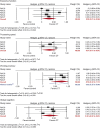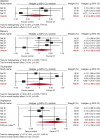Cognitive training in Parkinson disease: A systematic review and meta-analysis
- PMID: 26519540
- PMCID: PMC4662707
- DOI: 10.1212/WNL.0000000000002145
Cognitive training in Parkinson disease: A systematic review and meta-analysis
Abstract
Objective: To quantify the effects of cognitive training (CT) on cognitive and behavioral outcome measures in patients with Parkinson disease (PD).
Methods: We systematically searched 5 databases for randomized controlled trials (RCTs) of CT in patients with PD reporting cognitive or behavioral outcomes. Efficacy was measured as standardized mean difference (Hedges g) of post-training change.
Results: Seven studies encompassing 272 patients with Hoehn & Yahr Stages 1-3 were included. The overall effect of CT over and above control conditions was small but statistically significant (7 studies: g = 0.23, 95% confidence interval [CI] 0.014-0.44, p = 0.037). True heterogeneity across studies was low (I(2) = 0%) and there was no evidence of publication bias. Larger effect sizes were noted on working memory (4 studies: g = 0.74, CI 0.32-1.17, p = 0.001), processing speed (4 studies: g = 0.31, CI 0.01-0.61, p = 0.04), and executive function (5 studies: g = 0.30, CI 0.01-0.58, p = 0.042), while effects on measures of global cognition (4 studies), memory (5 studies), visuospatial skills (4 studies), and depression (5 studies), as well as attention, quality of life, and instrumental activities of daily living (3 studies each), were not statistically significant. No adverse events were reported.
Conclusions: Though still small, the current body of RCT evidence indicates that CT is safe and modestly effective on cognition in patients with mild to moderate PD. Larger RCTs are necessary to examine the utility of CT for secondary prevention of cognitive decline in this population.
© 2015 American Academy of Neurology.
Figures




Comment in
-
More than just a movement disorder: Why cognitive training is needed in Parkinson disease.Neurology. 2015 Nov 24;85(21):1828-9. doi: 10.1212/WNL.0000000000002158. Epub 2015 Oct 30. Neurology. 2015. PMID: 26519546 No abstract available.
References
-
- Emre M, Aarsland D, Brown R, et al. Clinical diagnostic criteria for dementia associated with Parkinson's disease. Mov Disord 2007;22:1689–1707. - PubMed
-
- Svenningsson P, Westman E, Ballard C, Aarsland D. Cognitive impairment in patients with Parkinson's disease: diagnosis, biomarkers, and treatment. Lancet Neurol 2012;11:697–707. - PubMed
Publication types
MeSH terms
LinkOut - more resources
Full Text Sources
Medical
